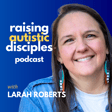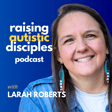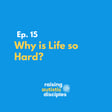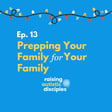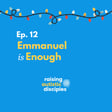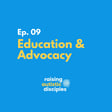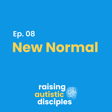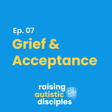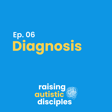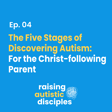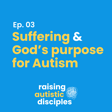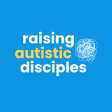Become a Creator today!Start creating today - Share your story with the world!
Start for free
00:00:00
00:00:01
This is the first conversation of five episodes discussing the five stages of discovering autism for the Christ-following parent. Larah talks with guest Lizzie Mears, a speech therapist and a friend that guided her during a hard season of denial. Though these stages and phases will look different for every family, it is our hope that the next series of episodes be ones to help identify, encourage and offer practical and gospel hope to take the next step forward on the autism journey.
Connect with us:
Instagram: https://instagram.com/raisingautisticdisciples
Facebook: https://facebook.com/raisingautisticdisciples
Email: raisingautisticdisciples@gmail.com
Transcript
Introduction and Episode Preview
00:00:00
Speaker
Hey everyone, this is Colin and I have the joy of introducing episode five of the Raising Autistic Disciples podcast. On this episode, Larry talks with our dear friend, Lizzie Mears. Larry and Lizzie are going to be talking on this episode through the denial phase of an autism diagnosis and all of its implications. If this is your first time listening, we encourage you to go back and catch the first few episodes as we try to lay a foundation for understanding autism from a biblical worldview.
00:00:26
Speaker
That'll be helpful so that when you get to this episode, it makes a little bit more sense of what we're discussing. The next five episodes are walking us through the five stages of discovering autism for the Christ-following parent. So we hope and pray that they are helpful and encouraging.
00:00:42
Speaker
And also one more thing, if you haven't already, please drop us a review of the podcast on whatever platform you listen and connect with us on social, whether on Facebook or Instagram and threads now as well.
Meet Guest Lizzie Mears
00:00:54
Speaker
All right, let's dive in and hear the conversation between Lara and Lizzie. Lizzie, thank you for being on the Raising Autistic Disciples podcast. So glad you're here. Well, thanks for having me. Tell us about who you are, your family, what you do, things like that.
00:01:11
Speaker
Okay, so I am a Christ follower. I'm married to Steve Mears and we have three children. They are 15, 12, and eight years old. And I've been an ASHA certified speech pathologist for 16 years. I've worked in the public schools for 12 of those years and I've done pediatric home health, hospitals, and nursing facilities. And I'm really honored to be here.
00:01:39
Speaker
Yes, we are too. I'll get into this a little bit more later in the episode, but Lizzie and Steve have been a blessing to my family and my whole family actually, not just Con and I, but my brother and sister-in-law and my mom, and so I'm grateful to have this conversation. But Lizzie, tell us what the good, the bad, the ugly, the funny, whatever you want to, tell us what an average day as a speech pathologist looks like.
00:02:06
Speaker
Okay, so an average day for a speech pathologist can vary. But for me, it looks like seeing students every 30 minutes, either one on one, a small group or inclusion, which is in the classroom setting.
00:02:21
Speaker
And my caseload size varies. I have an average of like 40 to 50 students usually, but lately my caseloads have been as high as 70 students.
Denial Phase of Autism Diagnosis
00:02:31
Speaker
And all of these students that I work with have deficits or delays in expressive language, receptive language, articulation, voice, swallowing, and fluency, which is stuttering. Gotcha. So you work with, what's the contact you have with parents?
00:02:49
Speaker
Oh gosh. Well, in the public school, unfortunately, it's not as great of parent contact as it was in pediatric home health, where I was literally going into their home, sitting with them and their child. But we have to contact parents immediately when we notice in the schools that there's something different.
00:03:06
Speaker
about a student or they're having trouble in a certain area. We can't actually even see the student as a speech pathologist until the parent says, okay, you can go and see my child. I would like for your opinion and your expertise on what's going on with their speech and language development. What's something while you're working with students that brings you joy?
00:03:31
Speaker
I love progress. I'm one of those that when I have progress, it's just such great joy to see a child be able to express themselves and feel confident to be able to communicate their wants and needs. It's a great joy that I don't think I can get any other place. Other than my own personal biological children learning and growing, that's joyful too. But I love to see them make progress.
00:03:58
Speaker
You know, that is one of the best parts of my job, honestly, is to see a child grow. Right, right. Absolutely. So just wanted to tell those listening how you and I are connected. And it's one of those reminders and the goodness of the Lord that He not only marks our steps, but He puts people in place even, I mean, absolutely when we cannot even see down the road how
00:04:25
Speaker
he's going to use people, but he puts people in our path and in our way to encourage us, to help us, to partner with us, and things like that. And so you and I are connected because the Lord brought you and Steve to serve as the student minister at my home church that I grew up at.
00:04:48
Speaker
But when you guys arrived in the great state of Louisiana, where I'm from, Colin and I were married. I think we may have, actually no, we didn't have any kids at the time, but you are most connected to my brother and mom as well.
00:05:06
Speaker
but have gotten to know you guys just through the connection with them, and we'll talk about a little bit later, a little bit more specifically, how you have been influential in my life, but we're really connected in that way. Also have friends that know you from the church that you all serve at, and so just grateful to have this conversation, specifically of how you
00:05:32
Speaker
helped me in the process of the stage, what we're calling a denial. And so that's what the next few episodes would be about. I kind of told that in the previous episode, but we're starting this series in season one called The Five Stages of Discovering Autism.
00:05:48
Speaker
for the Christ-following parent. Now that is really important that we put at the end of that for the Christ-following parent because I'm sure there's other podcasts out there that talk about the stages of autism or autism in general or disability in general.
00:06:03
Speaker
But we want to make sure, as said in other episodes, that this podcast is a resource and our prayer and our hope is that for those who want to raise their children in the fear and admission of the Lord that are on the autistic spectrum, that it can be done.
00:06:19
Speaker
And so these next few episodes are really diving into how Colin and I have experienced, because like we said before, we're no professionals. We're not psychologists, we're not counselors, but we are parents who love Jesus, who have an autistic son, who desire to raise him to be a disciple and a disciple maker. And so the first stage that we believe
00:06:46
Speaker
that we went through as we look back on our journey is denial. I think that is a stage which you will talk about a little bit more and lead us through, that it's one of the hardest. Not only is that the beginning of the journey, it's one of the hardest. And so just offer us, why do you think this is a stage in the autism journey?
00:07:08
Speaker
I think that this is the initial and most important stage of acceptance for your child who has autism spectrum disorder. You know, Elizabeth Kubler-Ross has those five stages of death and that the five stages of grief when someone dies. And I think that for a person who has a child with autism spectrum disorder, these can be helpful for you to know and like look through because
00:07:37
Speaker
These are kind of the descriptions to me of the stages of acceptance. And this is how it starts. Denial is probably the first stage in any grief situation is that this is not actually happening. This is not something that is real. And so I do think that this is a part of the autism journey because it is the beginning of understanding, honestly,
00:08:07
Speaker
a death to a life that you thought you might have, or a death to a life that you thought your child might have. And so this is the starting point. This is where it starts, is denial. Lizzie, is this normal? I mean, in the sense of like, when you serve your clients and your students and even getting to know parents, I think that's why a lot of us autistic parents are like, am I alone in this?
00:08:35
Speaker
Am I the only one? I think we feel like that about most things in our life. But I do think, yes, this is a very typical thing that I would see as a speech pathologist. I would say that some parents are not in denial, but they are lacking knowledge. And then once they get the knowledge, they may go through denial. But a lot of times,
00:08:57
Speaker
you know, run into parents that just don't know what a child is supposed to be doing and at what age they're supposed to be doing it. And so sometimes I run into that, that lack of knowledge, but more often than not, I see denial is the main barrier to a child beginning to receive supports from outside the home when it comes down to autism spectrum disorder.
Parental Challenges with Denial
00:09:18
Speaker
The denial is that first initial barrier, and yes, it is very, very normal and very terrible. Thank you for that. Just to let you know, in preparing for these next five episodes, at first,
00:09:33
Speaker
I put diagnosis first. So we were going to talk about diagnosis and then denial, but then as I started praying about it and just kind of thinking back over our journey now, now I want to let me take a time out for a second.
00:09:49
Speaker
I'm not saying that the autistic parent listening to this or the one that's kind of in the stage we are farther along, that every parent or every family, every child is going to go through these steps like we did. So it can look differently for every family, for every child. But for us, I went back and was like, you know what? We went through denial before the even diagnosis happened.
00:10:12
Speaker
So in some families, you may already have the diagnosis and then go through denial. But I think it's beneficial for us to talk about denial first so that when we get to diagnosis, we can refer back to this stage of, because I was in denial. I think I look back and if it was not for our conversation that we'll talk about in a few minutes,
00:10:37
Speaker
I don't know if I would still be in denial. I think the Lord would have given us a pathway to get a diagnosis because He does all things well and ordains all things in the time He does, but I do think I needed denial first before diagnosis.
00:10:53
Speaker
That's the kind of reason why in the progression of these next five episodes, denial is first for us. It may not be for you listening, but it's good to have this conversation before we do talk about the actual diagnosis. Lizzie, why do you think it's so hard? Why is denial so hard for parents and caregivers?
00:11:14
Speaker
I don't have a child with autism spectrum disorder, so I don't know why all of the things that they would go through, but I do think there is a fear of being afraid of what will happen to your child once you say,
00:11:31
Speaker
something is wrong, you know, like supposedly wrong. That's what people think or different about my child. What will happen to them? What will happen to us? What will it be like? There's this fear that just kind of creeps in. And I think that's why denial is so hard is because
00:11:49
Speaker
you know, you're having to think about, you know, that fear and fear is just crippling sometimes. So I think that's why it can be so difficult. You know, for you, what do you think? Why are you?
00:12:06
Speaker
Yeah, like I think that's exactly it. I think you hit that like fear is it takes over and I think what you said before is exactly it it's it's relinquishing the life that you thought or even desired or wanted to live and that that goes again to the conversation I had with pastor Connor is is God counted con I worthy God counted saw me
00:12:31
Speaker
to be Graham's parents. And so that's when that fear has to diminish and the trust in the Lord that He does all things well and that He is going to walk us through. That's when that intersection has to happen, right? And so I wanted to kind of just talk and tell the story
00:12:52
Speaker
of really why you're on the podcast today. Well, there's many reasons why you're on the podcast today. But why specifically I wanted you to talk with me about denial. And that's because it was an intersection. It was a big intersection for me in a sense of how that began. And it was, let's see, fall 2020.
00:13:19
Speaker
And, you know, just like I told in the introduction, we had made a big move to a new city, new states, new church, new friends, a year before this. And things kind of happened fast for us as far as just getting acclimated and whatnot. But as the fall of 2020, I had started a new job, a new office job, actually.
00:13:42
Speaker
Collin I talked in the last episode about the preschool fiasco. So I won't go into that if you listen to that But the preschool fiasco of dropping him off having to get him back 15 minutes later but also a God moment again of of meeting that preschool director her handing us the note of Calling the EC the Exceptional Children's program for the public school. So it was all a God I got thing but it was out of that
00:14:08
Speaker
After that happened, it was a month later. Just to be kind of a long story short, my uncle died. I had to fly home. It was on a Sunday. It was also promotion Sunday at our church. So everybody knows who has ever experienced a promotion Sunday at church. That means new teacher, new room, sometimes even new friends, things like that. And for an autistic child, that's huge.
00:14:33
Speaker
um that is that is uh you know what toys will be in this room uh another aspect to it there was no toys in this room because he was growing up and getting older so uh there i say that there may have been toys but there was a time and a place where they were pulled out so that was new for him right and so um again long story short uh threw him into a um it just triggered right i'm not there mom's not there
00:14:59
Speaker
Dad is on staff, right? And he's also, I think three at this point, three and a half. So that all kind of thing. So let's just sum it up. It was a really, it was a bad Sunday. But the point of the story is I didn't know that.
00:15:16
Speaker
which is a good thing. I don't think Colin knew that. I think our precious people at our church knew us, loved us kind of thing, knew what was going on, that I was flying home in grief and just needed it to stay. They had it in full control, right? Well,
00:15:34
Speaker
What I didn't know kind of came to a point three weeks later when I got invited to go to coffee with a lady who did say, hey, I was in Graham's class that Sunday and I would love to get to know you. Well, I'm thinking this is going to be fantastic. Like she wants to get to know me. She wants to get to know autism. We're always, you know, like, I know the autistic moms listening, we gravitate toward people who see us, you know, kind of thing.
00:16:08
Speaker
to not put too much out there, but I know those listening understand what I'm about to say is we, in the autistic parent community, if you want to call it that, there are a lot of marks and a lot of scars, I will say, over our lifetime in this journey where people hurt and they say things they don't intentionally mean.
00:16:24
Speaker
I went to coffee and just
00:16:32
Speaker
I don't think anybody thus far in my life has intentionally meant to hurt me with their words concerning my son. But in this conversation, it very quickly turned from getting to know me to telling me all the bad things he had done that day. And I, at this point, remember, we're not even in denial yet.
00:16:57
Speaker
We're, we're in a conversation of, uh, well, now that I'm talking it through, uh, if you want to add another D word in it, it would be, it would have been defense, right? Right. Yeah. So like I am an hour away, which I'm skipping ahead. I'm an hour away from denial, but at this point I'm in defense mode. And so I then in tears go to my defense mechanism of, well, we know he has behavioral problems.
00:17:25
Speaker
And I just kept apologizing and things like that. And tears were running through my eyes. And so I quickly, and what I'd encourage those who listening, I quickly knew in my spirit, this was not going to head in a direction that was going to be edifying or encouraging for me. So I politely cut it off and just said, thank you for
00:17:44
Speaker
I don't really even notice. Thank you for coffee. And I left that environment, that atmosphere because of just knowing that my emotions were about to just take control of me.
00:17:57
Speaker
And so from there, like I said, I had an office job I had to get to. And I remember I am crying all the way back to my office and I knew I couldn't go in like that. So I just started walking the lines in the parking lot, like the white lines in the parking lot, I just started walking them.
00:18:15
Speaker
And I remember my mom telling me, of course, I knew you. I knew your speech therapist, speech pathologist. But our relationship really was just kind of in passing. I mean, I knew my brother and sister-in-law loved you and Steve, obviously. But I remember thinking in my heart, the only person I know right now in my life is Lizzie to help give me something.
00:18:41
Speaker
Right. And so, and mom had encouraged me to do that as well. So I just picked up my phone. She had given me your number. And I just called you out of the blue. Like it was 930, 9am in the morning. You graciously answered. And Lizzie, I remember walking those lines in the parking lot. And
00:19:05
Speaker
You know, it's so funny how you talk these things out. And that's why Collin said last time is this podcast has been therapeutical for us in a sense of, now I was in defense mode, there's no doubt, because I was trying, it was almost like I was trying to convince you, the professional,
00:19:25
Speaker
Do come on my side of his non-autistic or nothing's wrong.
Acceptance and Advocacy
00:19:29
Speaker
I was trying my best, walking those lines in the parking lot, trying to convince you, Lizzie, he has said some words and he does make eye contact at times. His behavior is not that bad kind of thing. I remember telling you, oh, he's so great. He can repeat every line to Toy Story.
00:19:49
Speaker
I'm like, isn't that so fantastic? And this is me in defense, but this is also me coming into the process of denial of if he can say every line to Toy Story, then this must be a good thing. And now I know as you, and when I let you
00:20:10
Speaker
When I took a breath and let you into that conversation, you began to explain to me, that may not be such a good sign, but you did it so gracefully. As I did take that breath and said, what do you think? I do remember you taking a breath, and I'm sure it was
00:20:28
Speaker
asking as we were both you know we love Jesus taking your breath to ask the Lord to help you graciously and is exactly what you did tell me but what I will say and then I'm gonna let you tell what you remember that conversation but as I listen to you you
00:20:49
Speaker
You so graciously and lovingly walked me through one of the hardest moments of my life in a sense of both spiritual and practical and I think that's one thing as women who believers is If we could understand that in our as we link arms with one another is is not to jump so quickly to the practical but to
00:21:18
Speaker
always point each other to the gospel, always point each other. And that's what you did for me is you mixed the two together so perfectly in walking me through that God has great plans for Graham and God sees me. And that was huge in a sense of it prepared me for what you're about to say.
00:21:36
Speaker
And so, and it all comes down to this, and this is what I've been curating when I've told our story, is you told me on the other, you said, you, I needed, I needed, I wouldn't say blunt, but I needed straightforward, like, as I was telling the story, and I was telling you, you said, okay, I'm gonna stop you right there. Sweet Lara, we're gonna say it out loud. That's what you said.
00:22:05
Speaker
going to say and I wasn't ready to say it out loud but you you said it three or four times no we're going to say it out loud he has autistic signs he and and of course you you like other uh professionals you're you're not you're not a psychologist you're not going to diagnose him but you said we're going to say it out loud something is happening here we need to start the journey
00:22:27
Speaker
to get you intervention and so you helped me and let me just tell you at that moment saying it out loud agreeing and hearing you help me with that brought freedom and I don't even know how to explain it but saying it out loud what it was what it was helping me do is this right here along with what we just talked about fear but what it was helping me do
00:22:50
Speaker
is understanding, coming to the realization that I could not control or fix this in our life. I couldn't control or fix it. I had to relinquish it, not only to the Lord, but relinquish it. That's something, and what you helped me do in that conversation is the whole wrong word. It kind of pushed that to the side, is that as we speak this, as we say, okay, he's autistic, he is different, he has a disability,
00:23:20
Speaker
Now, what do we do brought so much free? I mean, do you remember that conversation? Yes, I do remember this conversation. In fact, this is therapeutic for me too, because I'm learning as well. Even though you do this for years and years, you just learn when you go through each person that you have to help. You learn yourself and you're also helping others.
00:23:42
Speaker
I did not know you had that kind of a day. I did not know what had happened before, and I need to remember that when I'm talking to people, they're not always in my world of, I see what this is, this is this, go with it. That people are just really struggling with all of life that is difficult, and to remind myself to think that way. So I'm thankful that I get to hear you say all of that, because I don't always get the backstories on what's going on in someone's life prior to me.
00:24:12
Speaker
telling them, you know, your child has characteristics of autism and I'm concerned about that and that this is not the end. This is not a problem. This is actually the beginning of goodness because once we are able to say those things and say it out loud and
00:24:27
Speaker
you're saying it out loud as a parent, people are gonna wanna come alongside you to support that and help that. When you're in that defense mode and denial mode, it's very difficult for anyone to support you because you're telling them there's nothing wrong. And so it's hard for someone to come in and support that. So I knew if you were gonna get help, you're states away from me. If you're gonna get support and help,
00:24:53
Speaker
you're the first advocate for your child. And so I thought maybe if I, and this generally what I think, if I can get the parent to recognize what's happening, that's going to be way more beneficial than anything I can say and do for this child. Because a parent is with that child all the time and it's going to get the other supports that they need. And so that is literally what I was thinking when you're talking to me is I've got to get her
00:25:20
Speaker
to stop saying there's nothing wrong or different or whatever. That's usually what happens in denial mode is people are defensive. So you may not have thought you were in denial already, but I really do think when you're defending your child constantly, that is some sort of denial of like, why would I defend this? What is happening? Why am I having to defend all the things that my child is going through? So defense can be like even an eye opener to a parent that there could be something
00:25:48
Speaker
That's not typically developing correctly, not necessarily wrong, but different. And I think that's a big part of autism too, is that a lot of people assume that this is so bad and this is going to ruin everything for our child or my life.
00:26:03
Speaker
And the truth is, it's just different. It's just a different way to learn, a different lifestyle, a different... Everything's just different. It's not bad. It's just different and different is not bad. It is not wrong. That's right. Because he's an image of God. He displays his characteristics. So it's no, it's beautiful. Yeah. And you helped me too. I mean, what you just said, like I was a barrier.
00:26:29
Speaker
Right. You think you're the best for them because you're like pointing out all their positives and he does have all those positives. But if he's going to function in all the academics and all the world and all the settings, the stores and all, if he's going to function in other environments beyond you right next to you, you have to start recognizing how to help him to do that. And I think you can't recognize that until you know why.
00:26:54
Speaker
he's not functioning in all of these environments. I think that's just how that conversation went in my mind. I have to help her to advocate for her child and we got to get past the denial. Right. Absolutely.
00:27:09
Speaker
You did it in grace and in love and because one thing I don't know if you knew this back then or even that like I do struggle with labels and so that's a whole another conversation but I you know been labeled a kid of divorce my entire life I've been told I'm emotional kind of thing so
00:27:27
Speaker
I have labels, a list of them. But when it comes down to my kid, I do not want my kid labeled. So that was a big issue, too, that you helped me see. And it goes back to the freedom of saying it out loud. But it's just a journey of learning that it's not a label to bring. It's not, though some would see it as a negative label, it really is just a discovery of how God made him.
00:27:56
Speaker
Yeah, absolutely. It's discovering the differences in your child. And it's not to bring harm, it's to bring help the way I see it in my world of speech pathology. And I do think that helping people understand what autism is, is like a huge part of helping them through denial. I usually try and explain it to them in a way that they just not like movie scene explains it, you know, when you see a child who has autism, you just immediately think of
00:28:23
Speaker
these particular
Moving from Denial to Diagnosis
00:28:24
Speaker
characteristics. It's such a broad spectrum of characteristics that I like to help people see that aspect of it. And, you know, ASHA, the American Speech and Hearing Association defines autism spectrum disorder as a developmental disability that causes problems with social skills and communication that may be mild to severe.
00:28:47
Speaker
And so that changes things when you think about autism, you're not looking at it as a bad behavior kid, you're looking at it as communication deficits, social skills deficits, you know, and then it does have other behaviors sometimes. The American Psychiatric Association defines it a little more semantically as a complex developmental condition involving persistent challenges with social communication, restrictive interests,
00:29:16
Speaker
and repetitive behaviors. So when you look at both of those, that social communication part is the one that I try and help parents see is the big definer in a child with autism spectrum disorder. So if your child is having difficulty socially, you need to put the red flags up because that's not a typical developmental
00:29:37
Speaker
thing that you might have. So when I start to say that, they kind of let go of, they just have a speech issue, or they just have a behavior issue, or they just are ADHD, or they're just sensory. All the just, when you say it's just this, just that, just this, that is where it kind of gets complicated because autism spectrum disorder can have all of that. And parents in denial cling to the, it's just this.
00:30:04
Speaker
It's just that they just have problems with this and they just have problems with that. And can't you all accept my just, if you can look at it as the whole of autism spectrum disorder, it's going to change the way you support your child and the way everybody else supports your child. Um, and I think that's such a huge step, you know, toward allowing your child to function in all the environments. And that's my goal as a speech pathologist is to help a child function in their academic environment, or that's generally my, my, my goal academic.
00:30:33
Speaker
or other social environments with friends on the playground and in a store, that's where I come in, is to help them socially, pragmatically interact with other people. But I do think, in denial, this understanding of what autism section disorder is will help you get through that denial stage a little bit easier than just assuming you know what autism is and your kid does not have that.
00:30:59
Speaker
because it's very complicated to treat and it's very complicated to diagnose. And so I think a lot of people run into professionals even that say, oh no, your child certainly does not have autism spectrum disorder at two. And I'm like, oh, okay. You know, so it's hard to define at two a child's social abilities unless you have a person who's professionally qualified like a speech pathologist to say,
00:31:28
Speaker
You know, here's what two-year-old socialization looks like. Are they doing that? You know, and then having that input is helpful because, again, people in denial are not looking for help often. They're not looking for someone to tell them what's different about their child because they're
00:31:47
Speaker
in denial. Anyway, I think that that can be a huge step is to just let go of what you think your child just has this one thing or just has this special cork or just has this, looks at toys upside down and they're just like that. They just are so smart. They want to figure out the wheels. When you let go of some of that and go
00:32:09
Speaker
no other child is doing that, then it really does open up the opportunity for you to step out of denial and into progressing toward how your child is going to live and function in this world.
00:32:24
Speaker
right absolutely so that that's a great okay so talking about spiritual and practical right we'll get to talking about spiritual in a second okay i want to continue with that thought being let's chat about the practical okay so you just gave us one um and and calling it steps is fine but but really just how to how to lead us in the direction of listen we're not saying
00:32:46
Speaker
to speed through this stage. But we are saying there are ways to help get to a point to where, like you said, not being the barrier to further intervention. Okay, so you just told us, one, be aware and just get past the just of realizing, understanding what autism is, like you listed, you read. And so that can be a first line, first step. And then secondly, just to offer this as a parent,
00:33:15
Speaker
It would've been really easy for me to disregard the truth that you spoke to me and just say, you know what? Yeah, I'm gonna choose what I believe or what kind of thing, and that's denial, obviously.
00:33:30
Speaker
But for us as parents, it's to be open for voices of truth, and ones that love and care for us, absolutely. But also, professionally speaking, so first being, understand what autism is, that it's not wrong, like you said, to being open to hear people. What's another after that? What's something to move us quickly into the diagnosis?
00:33:58
Speaker
I think just calming that fear, you know, the fear of crippling part of it. And I think once the fear is calmed, which I think is through those things that I was just listening, is once that fear is calmed, it's a good way to support people to say,
00:34:14
Speaker
you're not alone. You think that this is just you. You're the only one and you know, your child's going to be ostracized or whatever. Just reminding parents that autism spectrum disorder can be and children who have it often are extremely brilliant, but they just learn differently and they may show brilliance differently and that you have to advocate for your child on health
00:34:43
Speaker
to help others people see that. How to help other people know that your child has abilities, like you were trying to tell me, I know they have these abilities. You should see them do these things and help other people understand that that is just different and that is brilliant. And there are great, wonderful things that the Lord has already seen and already ordained in your child's life that he's going to
00:35:07
Speaker
use this life for his glory and to bring him honor. And so, and I think that's a Christian perspective. I don't always get to say those things to people like in my field of work.
00:35:18
Speaker
but that God made your child, he already knows he loves your child more than you do. And you need to calm that fear in you that the Lord can't help you or help your child.
Faith and Overcoming Denial
00:35:32
Speaker
He is ready and ready to do that work in your life. And I think that calming that fear really does help a parent move out of denial.
00:35:44
Speaker
Absolutely. And what a segue to keeping on that same encouragement to moving out of fear. How do we see those in the Bible, like both positively and negatively? Like my first thoughts is right out of Genesis, Abraham and Sarah, you know? God tells them what's going to happen. They're going to have a baby at this old age, but fear sets in and they cause a denial, doubt and denial, right? Right.
00:36:11
Speaker
Yeah. And that story obviously carries out through the entire Bible. Yeah. And denial, I think, is in the scriptures in a way to help us know we are going to be in denial. All of us are in denial about something right now as we're sitting here, and that the Lord knows that.
00:36:32
Speaker
we're going to be in denial and that he desires for us to go through that, like be on the other side of it. And I think too, you know, I was thinking on biblical example of denial and where I've seen it. And, you know, I think that Peter is a great example because
00:36:54
Speaker
The Lord told him and basically knew that you're going to deny, you're going to be in this age of denial of what the struggles I'm going to bring you through and the struggles I'm going to put into your life. You're going to go through this denial.
00:37:10
Speaker
And then the Lord also knew that, you know, he could use that weakness and build a church. And so I think that's a great example of knowing God knows already where you are right now if you're in denial as a parent of a child who has autism spectrum disorder.
00:37:28
Speaker
He already knows that you're in denial and he desires to come right there where you are, right where you are in that denial stage and help you move toward where you need to be in order for this child to be a disciple of the Lord. He desires for your child to honor and glorify.
00:37:45
Speaker
him. And so if he desires for your child to honor and glorify him, and that's what you desire, he's going to help you to do that. That is his role for all of us. And so I do think that he knows you're in denial if you're there, and that he desires to help you through
00:38:05
Speaker
this stage if it's for autism spectrum disorder and all other denials that we're in. He desires to help us to have faith and trust to believe that he is who he says he is, he will do what he says he's going to do, and he always has done what he says he's going to do. So that faith is going to help bring us through that denial stage for whatever we're going through denial in, especially autism spectrum disorder.
00:38:29
Speaker
That's right, because what's the opposite of denial is exactly what you just said, faith and trust. That's right. That's the opposite of it, because we see that with Peter in the Bible walking on the water. We see that with the man who cries out to Jesus, you know, help my unbelief.
00:38:48
Speaker
That's a prayer that can be on the hearts of us as parents with autistic children. Not only James 1 of Give Us Wisdom, but also, Lord, help my unbelief where I don't believe. Help me believe. Help me not to have denial. Help me to believe in you and put my faith and trust in you. Just like you said, that he is good to his word.
00:39:07
Speaker
You know, we see that so many other times in Scripture too, but I think it's important, and what I've been learning over the past year of suffering in a sense of, like we've talked about before, laying down what we thought life was going to be, is ultimately understanding and reflecting on eternity.
00:39:27
Speaker
That's been a huge reminder of this world is not our home. The most important thing is, like I said earlier, I can teach my daughter how to throw a fast pitch softball. I can teach my boys how to load the dishwasher.
00:39:44
Speaker
but and I can also learn all I can about autism and I can be the best mom providing a whole house full of sensory stuff. I can get him the best therapies you know or whatever but at the end of the day
00:39:59
Speaker
the most important thing is that he knows that he is loved by the king of the universe, Jesus Christ, and that God loves him, and that the gospel, him putting his faith and trust in Christ, no matter how that looks like, because it's going to be different for all us as a kid, but that's
00:40:15
Speaker
over all the sensory, over all the autistic knowledge, the most important thing is that Graham knows that he is loved by Jesus and when he places his faith and trust in him, he will live forever. And that's my prayer and that's our goal for this podcast is to help walk alongside parents that are going through the same as we are in doubt and denial and understanding that Jesus did say to when he healed
00:40:45
Speaker
many people pick up your mat and walk. Yes, this denial process is a stage, but there does come a point as a Christ following parent where we pick up our mat and walk, where we put our faith and trust in Jesus and we say, you know what? He has given us this diagnosis for such a time as this so that others can see the glory of God and the power of Him working in us. So, Lizzie, just in
00:41:13
Speaker
closing, what would you encourage the Christ-falling parent that is raising autistic disciples in their home? How would you encourage them?
00:41:23
Speaker
I think I would just remind them that, um, like you said, the Lord gave you this child and he is going to be with you every step of the way to, um, to love this child, to encourage this child and to raise them to know him as a Christ following parent. That's what your goal is to raise your children, to know him and love him and enjoy him forever. And, um, that it starts with the parent. The parent is the one.
00:41:53
Speaker
that is going to advocate for that relationship with the Lord and also all the other environments that they have to be in. That's our goal. Our goal is, like you said, I think in a previous podcast, because I had the privilege to listen to it, that we are not trying to make autism go away or change our child to be something they're not.
00:42:14
Speaker
God created your child as they are, He loves them as they are, and He is going to help you parent that child to follow Him and love Him. So that's what I would encourage a parent to do is to remember the goal and that your goal is not to convince everyone else in the world that your child is fine or that your child is
00:42:40
Speaker
this thing that you want them to be, your child is who they are, and you are to love, provide, and disciple them to know the Lord.
Conclusion and Podcast Mission
00:42:50
Speaker
So that's your goal. Absolutely. It is. Absolutely. Lizzie, thank you so much for not only
00:42:59
Speaker
who you are, not only what you mean to me but also just this ripple effect that I know the Lord is using you in your profession and also just being a friend to those who call on you. Thank you so much for being on the podcast talking about this this somewhat hard but beautiful also topic of denial and we wish you the best.
00:43:23
Speaker
Thank you for listening to an episode on the five stages of discovering autism for the Christ-fallen parent. Friend, blessings as you raise autistic disciples for the kingdom.

